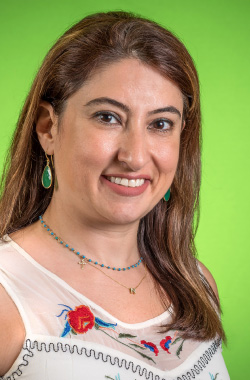3 steps to detecting breast cancer in the early stages
- Category: Women's Health, Living Well, Cancer Care
- Posted On:
- Written By: Dr. Nelly Aoun

In the early 1900s, the colors of black and orange began to sprout up in October in the United States as this country started celebrating Halloween. Today, another color is also symbolic this month, and that color is pink, as October is also widely known as National Breast Cancer Awareness Month. Despite tremendous medical advances, breast cancer continues to be the second leading cause of cancer deaths. It is for that reason healthcare professionals encourage all women to undergo yearly exams as early detection is the first step to stopping this disease.
What is breast cancer?
Like our skin, our entire body consists of living tissue made up of tiny cells. While you can see what is happening on the outside of your body, inside is a different matter. As we go through life, normal cells in our body reproduce and when the body doesn’t need them anymore, the cells die. But sometimes, cells change or become abnormal, and it’s those abnormal cells that can become cancerous. If not detected early, they continue to reproduce and can spread throughout the body. If these cells end up in breast tissue, you could be at risk for:
- Noninvasive Breast Cancer – also called carcinoma in situ, where the cancer cells are located in the ducts of the breast
- Invasive Breast Cancer – when the cancer cells move into the lobules and nearby breast tissue
- Metastasis - where cancer cells move into the lymph nodes or bloodstream and then moves into other parts of the body
While there’s no way of completely preventing cancer from occurring, there are things you can do to be proactive when it comes to your health.
Three steps to detect breast cancer in the early stages
As with all cancers, you have a better chance of survival if detected early. When it comes to breast cancer, there are things you can do as preventative medicine:
- Get a mammogram, which is a special X-ray that allows a doctor to check for abnormalities in the breast tissue. Mammograms can detect abnormal cells long before they can be felt. Most doctors recommend that women start getting a mammogram at age 40.
- Perform a breast self-exam every month and if you notice even a small change, like a bump appearing, contact your doctor.
- Know your family history as it’s now known that a blood relative who has been diagnosed with breast cancer can increase your risk for developing breast cancer. If that’s the case, you may be advised to undergo a mammogram at an earlier age or have one more often.
Though not as common, men can also get breast cancer
Cancer specialists say an estimated 325,000 women will be diagnosed with breast cancer this year, resulting in more than 42,000 deaths. But women are not alone; an estimated 2,620 men will also be diagnosed with breast cancer resulting in over 500 deaths. Like women, family history is among the risk factors for men as doctors believe that genes play a role in the development of breast cancer in men, as well as other factors:
- Being 60 years of age or older
- Radiation exposure, such as radiation used to treat other cancers, especially in the chest area
- Estrogen used to treat prostate cancer
- Heavy alcohol use and obesity
- Having other diseases that are treated with a high level of estrogen or low levels of male hormones
While breast cancer is much more common in women, men should also pay attention to this disease, and October is the month for both men and women, especially if you are considered at-risk.
West Jefferson Medical Center offers a comprehensive cancer program, including the only Radiation Therapy Department on the Wesbank of New Orleans, cancer care technology including da Vinci Robotic System, PET/CT and digital mammography, palliative care, survivorship care planning, and clinical trials.
Now is the time to focus on breast cancer, and West Jefferson Medical Cancer Care is here for you. Now through October 31, West Jefferson Medical Center is offering $99 self-pay mammogram screenings at two convenient locations. To make an appointment, call 504-349-6300 or visit wjmc.org/survivor.
To learn more about West Jefferson Medical Center's cancer care, visit wjmc.org/cancercare.
 About Dr. Nelly Aoun:
About Dr. Nelly Aoun:
Dr. Nelly Aoun is a board-certified physician in Internal Medicine, Hematology, and Oncology. Her interests in Hematology-Oncology include diagnosing and treating a different variety of cancers, clinical research, and palliative care. She has also started an early screening and prevention program to detect and manage patients with a high risk of developing breast cancer.